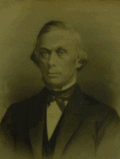| |||||||||||||||||
| |||||||||||||||||
 County results Cannon: 50–60% Jefferson: 50–60% | |||||||||||||||||
| |||||||||||||||||
The 1862 Delaware gubernatorial election was held on November 4, 1862. Incumbent Democratic Governor William Burton was unable to seek re-election. Samuel Jefferson ran to succeed him as the Democratic nominee, and he faced National Union candidate William Cannon, the former State Treasurer. Cannon narrowly defeated Jefferson, [1] and in so doing, was the last Republican-affiliated candidate to be elected Governor until 1894.

